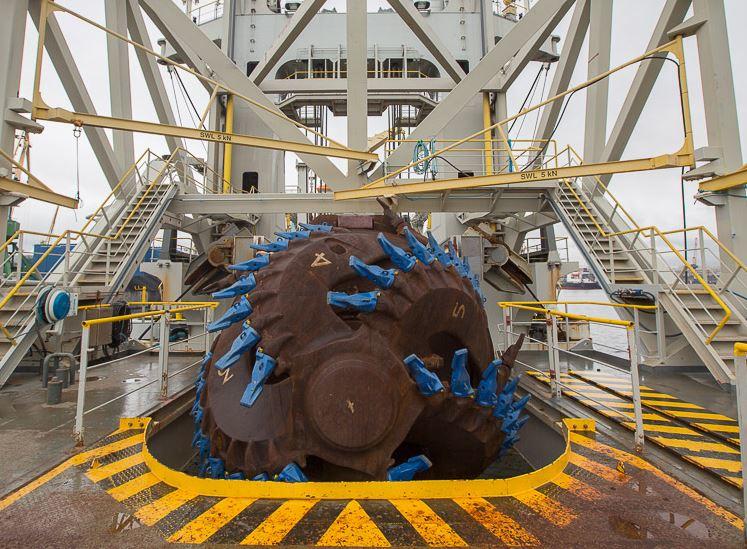
YAMAL: $27 BLN INVESTMENT

Dozens of Russian energy ventures are in jeopardy due to Western sanctions on technology and funding. Looming over them all, a giant project the Kremlin is bent on saving no matter what.
The Yamal plan, a $27 billion investment to tap vast natural gas reserves in northwest Siberia, aims to double Russia's stake in the fast-growing market for liquefied natural gas. If it stays on track, it will also show the West that the world's largest energy industry is not cracking under sanctions.
Russia has said it will make sure Yamal has the resources it needs to keep building. But that pledge will be tested: Yamal's gas is so far in the Arctic North that it requires specialised technology often provided by Western partners - many of which will not be able to operate because of the restrictions.
And while Yamal's shareholders have already invested $6 billion in it, U.S. and EU action has now effectively cut off the Russian energy firm's access to Western lending.
Nonetheless, bankers and analysts returning from a recent trip to Yamal said they were impressed by the project's status.
Some said it was hard to tell that Yamal's controlling shareholder, gas firm Novatek (NVTK.MM), and its billionaire co-owner Gennady Timchenko were subject to some of the most severe U.S. and EU sanctions targeting Putin after he annexed Crimea in eastern Ukraine and lent backing to pro-Russia separatists.
"I was astonished by the pace and amount of work that has been done," said Maxim Moshkov, oil analyst at UBS.
Some 6,000 people are currently working on the project and the number will rise to 15,000 next year.
"They work day and night... Having been there, I realised the project will most likely become a reality," Moshkov said.
Andrey Polishchuk from Raiffeisen bank said: "They are building a new airport, storage tanks. Ships are coming to a nearby port one after another. Some are unloading goods, some are waiting to unload".
POWERFUL PARTNERS
Yamal has powerful partners - French oil major Total (TOTF.PA) and China's CNPC.
Total said this week that despite the sanctions it would not be stopping work on Yamal and has suggested that, given Europe relies on Russia for a third of its gas, it would be risky to slow down the project.
Yamal will start exports from 2018 and has already pre-sold most of its future output to buyers in Europe and Asia. It will ultimately export 16.5 million tonnes of LNG a year - equal to 6 months of French gas consumption.
Novatek, along with gas monopoly Gazprom (GAZP.MM), has so far escaped European sanctions, but the fact that it is on the U.S. sanctions list makes it almost impossible for it to raise money for the project.
So Total is still clear to participate in Yamal. But its ability to finance its share in it through U.S. or European banks has been drastically limited.
"Can we live without Russian gas in Europe? The answer is no. Are there any reasons to live without it? I think - and I'm not defending the interests of Total in Russia - it is a no," Total boss Christophe De Margerie told Reuters.
Timchenko, co-owner of Novatek, is also a force to be reckoned with - his closeness to Russian President Vladimir Putin giving him heft even as it makes him a target for sanctions.
In March 2014, the United States slapped the first round of sanctions on him, explaining: "Timchenko's activities in the energy sector have been directly linked to Putin".
Putin subsequently made Timchenko Russia's point person for business relations - including the development of key gas projects - with China.
Timchenko has said China, which has a 20 percent stake in Yamal through CNPC, has agreed to lend $20 billion before the end of 2014.
But there is still work to do to win that loan.
"We have had communications from higher management over compliances that we shall strictly follow international rules," a Chinese banking executive told Reuters on condition of anonymity given the delicate nature of the negotiations.
"Basic principles are - we shall not deal with entities that are sanctioned...We don't want the U.S. to find excuses to give us trouble."
SUPPORT FROM HOME
If China can't put up the money, Putin is likely to.
The Russian government, which has accumulated the world's third largest forex reserves of $460 billion, has said it will invest money in profitable projects which can guarantee hefty payouts to state coffers in the future.
Various officials have pledged support to Gazprom, state oil firm Rosneft and pipeline and railway monopolies Transneft and RZhD.
And Prime Minister Dmitry Medvedev told Novatek's chief and co-owner Leonid Mikhelson that Russia would support other companies too, irrespective of their ownership structure.
"Should (their Chinese lending) plan fail, they can count on state support. The government has made it clear it will not allow it to fail," said a Western oil executive close to the project.
The crunch point for Yamal will come next year when France's engineering firm Technip needs to deliver the core liquefaction plant - technology that Russia is lacking.
Technip (TECF.PA) told Reuters this week it was moving forward with the project. It had earlier warned about the risks to its income from sanctions on Russia.
If Technip should run into difficulties - the pace at which sanctions have evolved in the past months suggests more could yet be in the offing - Russia might be able to source the technology from China, which has in recent years become able to design and build large LNG plants.
"There might be an opportunity lurking in terms of supplying our own gas liquefaction technology," said an engineering executive at CNPC.
reuters.com





